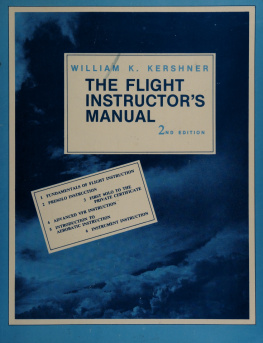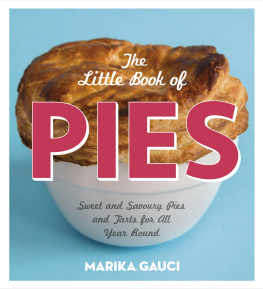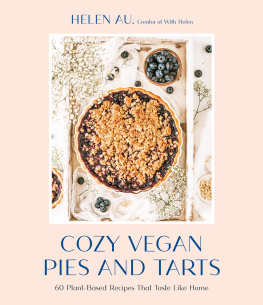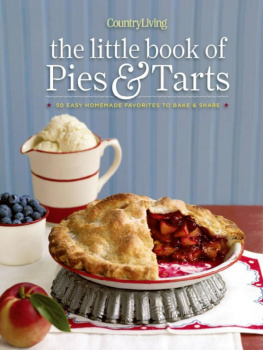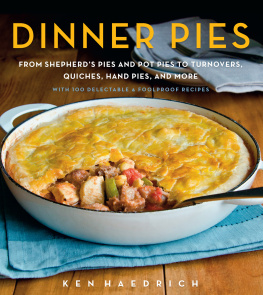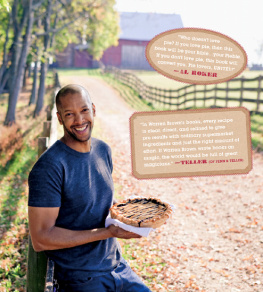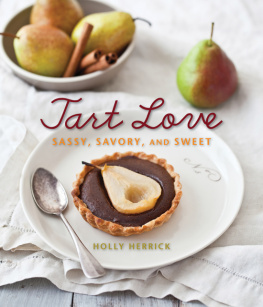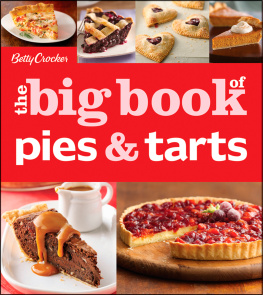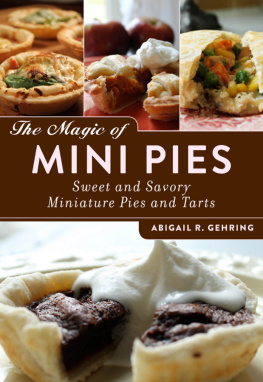Kershner - I [love] pies and tarts
Here you can read online Kershner - I [love] pies and tarts full text of the book (entire story) in english for free. Download pdf and epub, get meaning, cover and reviews about this ebook. City: Lanham;Maryland, year: 2005, publisher: Taylor Trade Publishing, genre: Home and family. Description of the work, (preface) as well as reviews are available. Best literature library LitArk.com created for fans of good reading and offers a wide selection of genres:
Romance novel
Science fiction
Adventure
Detective
Science
History
Home and family
Prose
Art
Politics
Computer
Non-fiction
Religion
Business
Children
Humor
Choose a favorite category and find really read worthwhile books. Enjoy immersion in the world of imagination, feel the emotions of the characters or learn something new for yourself, make an fascinating discovery.

- Book:I [love] pies and tarts
- Author:
- Publisher:Taylor Trade Publishing
- Genre:
- Year:2005
- City:Lanham;Maryland
- Rating:4 / 5
- Favourites:Add to favourites
- Your mark:
- 80
- 1
- 2
- 3
- 4
- 5
I [love] pies and tarts: summary, description and annotation
We offer to read an annotation, description, summary or preface (depends on what the author of the book "I [love] pies and tarts" wrote himself). If you haven't found the necessary information about the book — write in the comments, we will try to find it.
Kershner: author's other books
Who wrote I [love] pies and tarts? Find out the surname, the name of the author of the book and a list of all author's works by series.
I [love] pies and tarts — read online for free the complete book (whole text) full work
Below is the text of the book, divided by pages. System saving the place of the last page read, allows you to conveniently read the book "I [love] pies and tarts" online for free, without having to search again every time where you left off. Put a bookmark, and you can go to the page where you finished reading at any time.
Font size:
Interval:
Bookmark:
PERFECT PIE DOUGH
CREAM CHEESE PIE DOUGH
COOKIE CRUST
SWEET TART DOUGH
NO-ROLL PIE DOUGH
SAVORY TART DOUGH
getting started
The secret to a great pie is fresh ingredients: ripe fruit, fresh dairy products, and the best-quality chocolate available to you. A great pie also needs a well-executed crust: flaky, flavorful, and cooked through. By following a few key principles about ingredient temperature, mixing, handling, relaxing, and baking, youll find the perfect piecrust is easily attainable.
The liquids and fats should be well chilled before they are incorporated into the dough. Chilled fat keeps the gluten in the flour from becoming tough. Work the fat completely into the flour before adding the final liquid. Manipulate the dough delicately, without pulling at it or tugging it. The dough will shrink and become tough or distorted with unnecessary handling. Handle the dough quickly, lightly, and with confidence. Rest the dough before baking. Give the gluten a short time to relax; the dough will shrink less when heat is introduced. The oven should always be hot before the constructed pie is baked. Understand the recipe completely before you begin, so you can work as quickly and efficiently as possible at every step.
Unless collecting kitchen gadgets is your hobby, keep your pie equipment simple. You will need a sturdy rolling pin. The most durable ones are usually made of hardwood and come with or without handles. Dough can be made by hand, with a knife or a pastry blade, or by machine, either a handheld mixer or a freestanding machine. I am partial to a freestanding mixer, mainly because I make a lot of dough. For the best results, I incorporate all the ingredients with a paddle attachment, then gather the dough together by hand and roll it out immediately. The dough then rests in the refrigerator already in the pie or tart plate. It sets up firm and is ready to bake almost as soon as the filling goes in.
Pie plates generally come in 8-inch, 9-inch, 9-inch, and 10-inch sizes. The shallowest plates are about an inch deep; the deepest are about 2 to 3 inches deep. Pie plates are made of various materials, from stainless steel to Pyrex, glass, and ceramic. Pies baked in thick ceramic and Pyrex will take a bit more time to bake than pies baked in metal pans.
For fruit pies, I prefer a deep dish that will hold in the juices and the fruit. A tart requires a straight-sided, shallow tart pan that produces a thin, elegant tart. Tart pans come in various sizes and styles. They are distinguished by their short ( inch to 1 inch), straight sides, as opposed to the sloping sides of pie plates. Most useful are tart pans with removable bottoms that allow you to gently raise your tart out of its mold and serve it either directly from the insert or after sliding it onto a plate.
Tinfoil and waxed paper are basic supplies that will be needed. They are handy for blind bakingcooking a pie shell without the fillingand for transferring raw dough from table to pie plate. So be sure to have these supplies at hand for when you need them. A few inexpensive tools are all you need to begin.
When a pie shell needs to be baked before being filled with a filling, you must blind bake your pie. To keep the sides of your pie or tart from collapsing, it becomes necessary to line the pie with a piece of paper or foil and fill that covering with weights. Special ceramic and metal pellets, referred to as pie weights, are available for this purpose. More affordably, uncooked rice, split peas, or any other kind of dry bean will work just as well. Fill your pie with the chosen weight and bake for 15 minutes. Remove the weights and paper when the crust appears dry and has begun to brown. Add your filling, and continue to bake until the pie is fully cooked.
Makes 1
double-crust pie
This recipe makes a perfect two-crust pie every time. With a little bit of butter and a little bit of shortening, the recipe achieves the perfect balance between taste and texture. Piecrust can also be made by using only butter or only shortening, or by substituting extra of one for the other. Just make certain the total amount of fat is the same as indicated in the original recipe. Butter gives the crust a more delicious flavor, while shortening makes a flakier crust.
Lard can be used in place of butter for all or part of the total fat content and will result in the flakiest, most flavorful pies possible.
If your diet doesnt include lard, butter, or any extra cholesterol, use shortening while making a piecrust. Additionally, eggs and butter in a filling can be replaced with a few tablespoons of tapioca, flour, or cornstarch.
2 cups flour
1 teaspoon salt
3 tablespoons sugar
cup or 1 sticks butter
cup shortening
56 tablespoons ice-cold water
In a mixing bowl, combine the flour, salt, and sugar. Cut the butter into small cubes. Make sure to keep the butter as cold as possible at all times. Add the fats (the butter and the shortening) into the mixing bowl, and cut the fat into the flour using a knife or the paddle attachment of a mixer. When the flour resembles coarse sand, add the cold water. Use the water sparingly, and stop adding the water when the dough begins to come together. Turn off the mixer, and finish bringing the dough together into a firm ball by hand. Mix the dough as little as possible to keep it tender.
Separate the dough into two equal-sized balls, and press them into flat disks. Lightly flour a counter surface, and flour the dough lightly. Roll the dough into round disks inch thick. To keep the dough round, turn the dough 1 inch clockwise after every roll of the rolling pin. Continue to flour the counter as you roll your dough to keep it from sticking: support the dough on the rolling pin, and spread fresh flour in the area where the dough will be rolled. When the dough is roughly inch thick and can easily cover the pie tin with 1-inch overhang, it is ready for use. Roll the dough loosely onto the rolling pin, and transfer it to the pie tin. The dough can also be transported by wax paper and lowered into the pie tin from the support of the paper. Gently work the dough into the bottom and sides of the pie tin, being careful not to tug or pull on the dough. When the dough sits snugly in the tin, chill the dough for at least half an hour in the refrigerator. Often, recipes call for resting the dough in the refrigerator before rolling. This makes the dough more difficult to roll and causes it to crack because of its firmness. It is much more efficient to roll the dough out before resting.
If you want to make dough days in advance and hold it in the refrigerator, make an heirloom pastry. Add 1 tablespoon of vinegar in place of 1 tablespoon of the water, and this dough will keep well in the refrigerator for weeks.
Keep the fats (butter, shortening, or lard) as cold as possible for the flakiest crust.
Roll your dough as soon as it is mixed.
Rest your dough in the pie plate in the refrigerator for half an hour.
Dont pull and tug at your dough.
If you prebake a pie shell, bake it until it is done to avoid soggy crusts.
Makes 1
double-crust pie
This dough is particularly good with tart cherry pie and mixed-berry turnovers. The recipe should make one pie with a lattice crust or one recipe of little fried pies.
2 cups flour
1 teaspoon salt
2 tablespoons sugar
cup butter
8 ounces cream cheese
Combine the flour, sugar, and salt. Cut up the butter and the cream cheese into pea-sized pieces. Incorporate the butter first. When the flour resembles coarse sand, add the cream cheese and mix until combined. Finish the dough by working it into a flat disk by hand. Roll immediately to inch thick and work into pie plate, or leave flat to cut out fried pies or turnovers.
Font size:
Interval:
Bookmark:
Similar books «I [love] pies and tarts»
Look at similar books to I [love] pies and tarts. We have selected literature similar in name and meaning in the hope of providing readers with more options to find new, interesting, not yet read works.
Discussion, reviews of the book I [love] pies and tarts and just readers' own opinions. Leave your comments, write what you think about the work, its meaning or the main characters. Specify what exactly you liked and what you didn't like, and why you think so.


